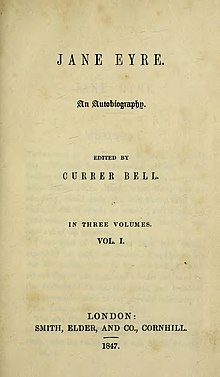Mr. Rochester

Title page of the first Jane Eyre edition
|
|
| Author | Charlotte Brontë |
|---|---|
| Country | United Kingdom |
| Language | English |
| Genre | Novel |
| Set in | Northern England, early 19th century |
| Publisher | Smith, Elder & Co. |
|
Publication date
|
16 October 1847 |
| Media type | |
| OCLC | 3163777 |
| 823.8 | |
| Followed by | Shirley |
| Text | at |
Jane Eyre /ˈɛər/ (originally published as Jane Eyre: An Autobiography) is a novel by English writer Charlotte Brontë. It was published on 16 October 1847, by Smith, Elder & Co. of London, England, under the pen name "Currer Bell". The first American edition was published the following year by Harper & Brothers of New York.
Primarily of the Bildungsroman genre, Jane Eyre follows the emotions and experiences of its eponymous heroine, including her growth to adulthood and her love for Mr. Rochester, the Byronic master of fictitious Thornfield Hall. In its internalisation of the action—the focus is on the gradual unfolding of Jane's moral and spiritual sensibility, and all the events are coloured by a heightened intensity that was previously the domain of poetry—Jane Eyre revolutionised the art of fiction. Charlotte Brontë has been called the 'first historian of the private consciousness' and the literary ancestor of writers like Joyce and Proust. The novel contains elements of social criticism, with a strong sense of Christian morality at its core, but is nonetheless a novel many consider ahead of its time given the individualistic character of Jane and the novel's exploration of classism, sexuality, religion, and proto-feminism.
The novel is a first-person narrative from the perspective of the title character. The novel's setting is somewhere in the north of England, late in the reign of George III (1760–1820). It goes through five distinct stages: Jane's childhood at Gateshead Hall, where she is emotionally and physically abused by her aunt and cousins; her education at Lowood School, where she gains friends and role models but suffers privations and oppression; her time as governess at Thornfield Hall, where she falls in love with her Byronic employer, Edward Rochester; her time with the Rivers family, during which her earnest but cold clergyman cousin, St. John Rivers, proposes to her; and her reunion with, and marriage to, her beloved Rochester. During these sections the novel provides perspectives on a number of important social issues and ideas, many of which are critical of the status quo (see the Themes section below). Literary critic Jerome Beaty opines that the close first person perspective leaves the reader "too uncritically accepting of her worldview", and often leads reading and conversation about the novel towards supporting Jane, regardless of how irregular her ideas or perspectives are.
...
Wikipedia
